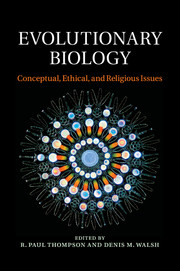Book contents
- Evolutionary Biology
- Evolutionary Biology
- Copyright page
- Dedication
- Contents
- Contributors
- Acknowledgments
- Introduction
- Chapter 1 Human evolution
- Part I Evolution and theology
- Part II Taxonomy and systematics
- Chapter 4 Consilience, historicity, and the species problem
- Chapter 5 DNA barcoding and taxonomic practice
- Part III The structure of evolutionary theory
- Part IV Function, adaptation, and design
- Index
Chapter 4 - Consilience, historicity, and the species problem
from Part II - Taxonomy and systematics
Published online by Cambridge University Press: 05 March 2014
- Evolutionary Biology
- Evolutionary Biology
- Copyright page
- Dedication
- Contents
- Contributors
- Acknowledgments
- Introduction
- Chapter 1 Human evolution
- Part I Evolution and theology
- Part II Taxonomy and systematics
- Chapter 4 Consilience, historicity, and the species problem
- Chapter 5 DNA barcoding and taxonomic practice
- Part III The structure of evolutionary theory
- Part IV Function, adaptation, and design
- Index
Summary
- Type
- Chapter
- Information
- Evolutionary BiologyConceptual, Ethical, and Religious Issues, pp. 65 - 86Publisher: Cambridge University PressPrint publication year: 2014
- 4
- Cited by

